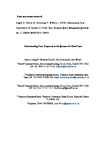Understanding fans' responses to the sponsor of a rival team
| dc.contributor.author | Angell, RJ | |
| dc.contributor.author | Gorton, M | |
| dc.contributor.author | Bottomley, P | |
| dc.contributor.author | White, John | |
| dc.date.accessioned | 2016-04-06T21:15:50Z | |
| dc.date.available | 2016-04-06T21:15:50Z | |
| dc.date.issued | 2016-03-21 | |
| dc.identifier.issn | 1618-4742 | |
| dc.identifier.issn | 1746-031X | |
| dc.identifier.uri | http://hdl.handle.net/10026.1/4479 | |
| dc.description.abstract |
Research question: What factors determine fans’ responses to the sponsor of a rival team? To what extent does higher in-group fan identification, more positive prior attitudes to the sponsor and a more congruent fit between the sponsor and club, cause denigration or mitigate negative outcomes for the sponsor? Research methods: 300 questionnaires were collected from fans of English Premier League football teams Newcastle United and Sunderland allowed us to test our model of sponsorship responses. Structural equation modelling was used to evaluate each hypothesis. Results and findings: Brands will gain greater benefits from sponsorships deemed to be congruent with the rival team and where a higher pre-sponsorship attitude exists. More highly identified fans tend to pay greater attention to the sponsor of their rival team. We find that schadenfreude is a better predictor of affective and behavioural responses than fan identification, despite its popularity in recent research involving rival fans. Implications: Brand managers concerned about the size and scope of out-groups can employ our findings to more effectively configure sponsorship activities. | |
| dc.format.extent | 190-213 | |
| dc.language | en | |
| dc.language.iso | en | |
| dc.publisher | Informa UK Limited | |
| dc.subject | perceived fit | |
| dc.subject | structural equation modelling | |
| dc.subject | schadenfreude | |
| dc.subject | rival fans | |
| dc.subject | Sponsorship | |
| dc.title | Understanding fans' responses to the sponsor of a rival team | |
| dc.type | journal-article | |
| dc.type | Journal Article | |
| plymouth.author-url | http://gateway.webofknowledge.com/gateway/Gateway.cgi?GWVersion=2&SrcApp=PARTNER_APP&SrcAuth=LinksAMR&KeyUT=WOS:000373818600005&DestLinkType=FullRecord&DestApp=ALL_WOS&UsrCustomerID=11bb513d99f797142bcfeffcc58ea008 | |
| plymouth.issue | 2 | |
| plymouth.volume | 16 | |
| plymouth.publication-status | Published | |
| plymouth.journal | EUROPEAN SPORT MANAGEMENT QUARTERLY | |
| dc.identifier.doi | 10.1080/16184742.2015.1135975 | |
| plymouth.organisational-group | /Plymouth | |
| plymouth.organisational-group | /Plymouth/Faculty of Arts, Humanities and Business | |
| plymouth.organisational-group | /Plymouth/Faculty of Arts, Humanities and Business/Plymouth Business School | |
| plymouth.organisational-group | /Plymouth/REF 2021 Researchers by UoA | |
| plymouth.organisational-group | /Plymouth/REF 2021 Researchers by UoA/UoA17 Business and Management Studies | |
| plymouth.organisational-group | /Plymouth/Users by role | |
| plymouth.organisational-group | /Plymouth/Users by role/Academics | |
| dcterms.dateAccepted | 2015-12-17 | |
| dc.rights.embargodate | 2017-9-21 | |
| dc.identifier.eissn | 1746-031X | |
| dc.rights.embargoperiod | Not known | |
| rioxxterms.versionofrecord | 10.1080/16184742.2015.1135975 | |
| rioxxterms.licenseref.uri | http://www.rioxx.net/licenses/all-rights-reserved | |
| rioxxterms.licenseref.startdate | 2016-03-21 | |
| rioxxterms.type | Journal Article/Review |


